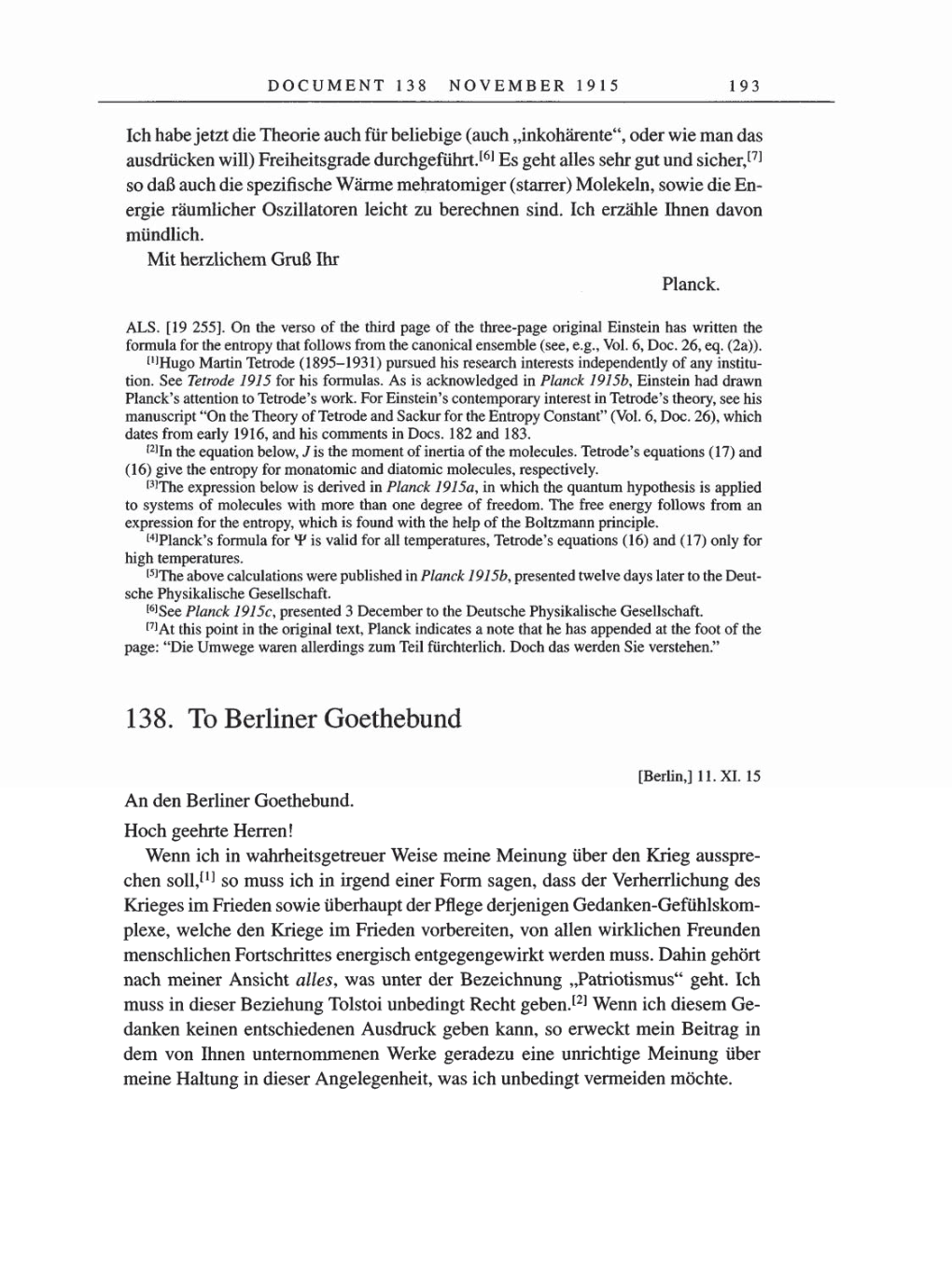DOCUMENT 138 NOVEMBER 1915 193
Ich habe
jetzt
die Theorie auch
für
beliebige
(auch "inkohärente",
oder wie
man
das
ausdrücken
will)
Freiheitsgrade
durchgeführt.[6]
Es
geht
alles sehr
gut
und
sicher,[7]
so
daß auch die
spezifische
Wärme
mehratomiger
(starrer) Molekeln,
sowie die En-
ergie
räumlicher
Oszillatoren leicht
zu
berechnen
sind. Ich erzähle Ihnen davon
mündlich.
Mit
herzlichem Gruß
Ihr
Planck.
ALS.
[19 255].
On the
verso
of
the third
page
of
the
three-page original
Einstein has written the
formula
for the
entropy
that follows
from
the canonical
ensemble
(see,
e.g.,
Vol. 6,
Doc.
26,
eq. (2a)).
[1]Hugo
Martin Tetrode
(1895-1931)
pursued
his
research
interests
independently
of
any
institu-
tion. See Tetrode 1915
for
his formulas. As is
acknowledged
in
Planck
1915b,
Einstein
had drawn
Planck’s attention
to
Tetrode’s work. For Einstein’s
contemporary
interest in Tetrode’s
theory, see
his
manuscript
“On the
Theory
of
Tetrode and Sackur for the
Entropy
Constant”
(Vol. 6,
Doc.
26),
which
dates
from
early
1916,
and his comments in Docs. 182 and 183.
[2]In the
equation
below,
J
is
the
moment
of
inertia
of
the molecules. Tetrode’s
equations (17)
and
(16) give
the
entropy
for
monatomic and diatomic
molecules, respectively.
[3]The
expression
below is derived
in
Planck
1915a,
in
which the
quantum
hypothesis
is
applied
to
systems
of
molecules with
more
than
one degree
of
freedom.
The free
energy
follows
from
an
expression
for
the
entropy,
which is found with the
help
of
the Boltzmann
principle.
[4]Planck’s formula
for
*P
is valid
for
all
temperatures,
Tetrode’s
equations
(16)
and
(17)
only
for
high
temperatures.
[5]The
above calculations
were published
in Planck
1915b,
presented
twelve
days
later
to the Deut-
sche
Physikalische
Gesellschaft.
[6]See
Planck
1915c, presented 3
December to the Deutsche
Physikalische
Gesellschaft.
[7]At
this
point
in the
original
text,
Planck indicates
a
note that he has
appended
at the
foot of
the
page:
“Die
Umwege waren allerdings zum
Teil fürchterlich. Doch das werden Sie verstehen.”
138. To
Berliner Goethebund
[Berlin,]
11. XI.
15
An den Berliner Goethebund.
Hoch
geehrte
Herren!
Wenn ich in
wahrheitsgetreuer
Weise meine
Meinung
über
den
Krieg ausspre-
chen
soll,[1]
so muss
ich
in
irgend
einer Form
sagen,
dass
der
Verherrlichung
des
Krieges
im Frieden sowie
überhaupt
der
Pflege
derjenigen
Gedanken-Gefühlskom-
plexe,
welche den
Kriege
im
Frieden
vorbereiten, von
allen wirklichen Freunden
menschlichen
Fortschrittes
energisch
entgegengewirkt
werden
muss.
Dahin
gehört
nach meiner
Ansicht
alles,
was
unter
der
Bezeichnung
"Patriotismus"
geht.
Ich
muss
in dieser
Beziehung
Tolstoi
unbedingt
Recht
geben.[2]
Wenn ich
diesem
Ge-
danken keinen
entschiedenen Ausdruck
geben
kann,
so
erweckt mein
Beitrag
in
dem
von
Ihnen
unternommenen
Werke
geradezu
eine
unrichtige Meinung
über
meine
Haltung
in
dieser
Angelegenheit, was
ich
unbedingt
vermeiden möchte.
